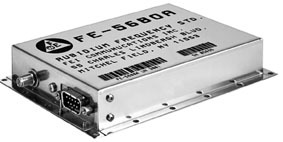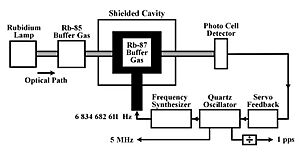Rubidium standard facts for kids
A rubidium standard, also known as a rubidium atomic clock, is a special kind of clock that uses the element rubidium to keep extremely accurate time. It is a type of frequency standard, which means it creates a super stable and precise "beat" or signal. This signal is used to control the timing in many electronic devices.
Contents
What is a Rubidium Atomic Clock?
Imagine a clock so precise it would take many thousands of years to lose just one second. That's what an atomic clock does! The rubidium clock is one of the most common and affordable types of atomic clocks.
While it's not the most accurate atomic clock in the world (that title belongs to caesium atomic clocks), it is still incredibly precise and very useful for many technologies we use every day. Because caesium clocks are the most accurate, they are considered the "master clocks" for the world, or primary frequency standards. Rubidium clocks are often set to match them, so they are called secondary frequency standards.
How Does It Work?
Rubidium clocks don't have gears or swinging pendulums like old-fashioned clocks. Instead, they use the special properties of rubidium-87 atoms to keep time.
Inside the clock is a small glass container filled with rubidium gas. A special lamp shines a beam of light through this gas, and a detector on the other side measures how much light gets through.
The clock also sends tiny energy waves, called microwaves, at the gas. When these waves have an exact frequency (a specific "vibration" of about 6.8 billion times per second!), the rubidium atoms absorb the energy. This causes the light passing through the gas to dim just a little bit.
The detector notices this dip in light and tells the clock's electronics, "That's the perfect frequency!" The clock then locks onto that super-stable frequency. This steady "beat" is used to keep perfect time.
Where Are Rubidium Clocks Used?
Because they are compact, affordable, and very accurate, rubidium clocks are used in many important technologies.
- GPS: Satellites orbiting the Earth have atomic clocks. They send out timed signals that your phone or car's GPS receiver uses to figure out your exact location.
- Cell Phone Towers: Cell phone towers use these clocks to stay perfectly in sync with each other. This helps your calls connect clearly and your internet data to move smoothly.
- Television and Radio: Television stations use them to keep their broadcast signals stable, so your picture and sound are clear.
- Science and Labs: Scientists use them in special test equipment for experiments that need very precise timing.
See also
- Hydrogen maser
 | Jackie Robinson |
 | Jack Johnson |
 | Althea Gibson |
 | Arthur Ashe |
 | Muhammad Ali |



